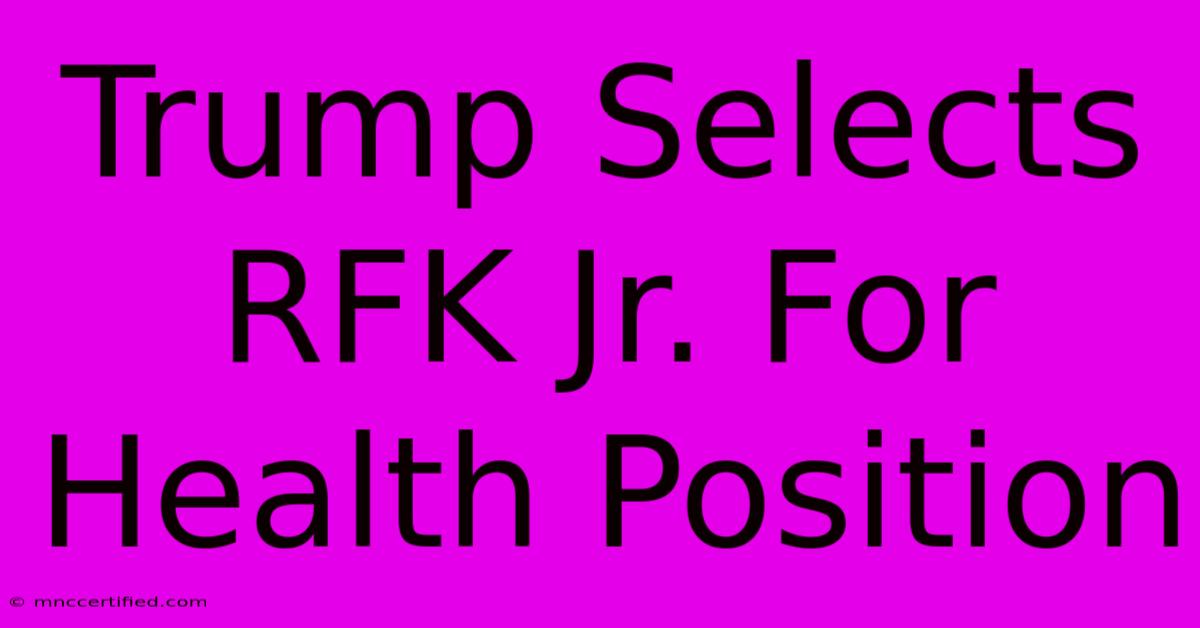Trump Selects RFK Jr. For Health Position

Table of Contents
Trump Selects RFK Jr. for Health Position: A Controversial Choice Sparks Debate
Former President Donald Trump has appointed Robert F. Kennedy Jr. to a leading position within his campaign's health policy platform, a move that has generated significant controversy and sparked heated discussions across the political spectrum.
Kennedy, a prominent environmental activist and outspoken critic of vaccine mandates, will serve as the head of a newly established "Health Freedom" task force. This appointment has fueled debate about Trump's stance on public health issues and the influence of anti-vaccine sentiment within his political sphere.
RFK Jr.'s Anti-Vaccination Stance: A Major Point of Contention
Kennedy's appointment has been met with widespread criticism, particularly from medical professionals and public health experts. His long-standing stance against vaccines, which he has claimed are linked to autism despite overwhelming scientific evidence to the contrary, has drawn widespread condemnation.
Critics argue that Kennedy's appointment sends a dangerous message, potentially undermining public trust in proven medical interventions and potentially leading to a resurgence of preventable diseases.
Trump's Health Policy Platform: Beyond Vaccines
While the vaccine controversy has dominated the discourse surrounding Kennedy's appointment, it is important to note that the "Health Freedom" task force is expected to address a broader range of health policy issues.
The task force's focus is likely to include:
- Access to healthcare: Addressing disparities in healthcare access and affordability.
- Medical freedom: Advocating for individual choice in medical decisions, potentially including issues like informed consent and the right to refuse treatment.
- Alternative medicine: Exploring the role of complementary and alternative medicine (CAM) in the healthcare system.
The Implications of Trump's Health Policy Platform
Trump's embrace of RFK Jr. and the "Health Freedom" task force raises important questions about the future direction of public health policy in the United States. The appointment highlights the growing influence of anti-vaccine sentiment within certain political circles and the potential for this sentiment to shape policy decisions.
The implications of this trend are far-reaching, potentially impacting:
- Public health initiatives: The effectiveness of public health initiatives aimed at preventing disease outbreaks.
- Vaccination rates: The potential for declining vaccination rates, leading to a resurgence of vaccine-preventable diseases.
- Scientific integrity: The erosion of trust in scientific consensus and expert opinion.
The Need for Informed Debate and Critical Evaluation
The appointment of RFK Jr. to a prominent health policy position is a significant development with potentially wide-ranging consequences. It is crucial to engage in informed and respectful debate on these issues, critically evaluating the scientific evidence and considering the potential impact of policy decisions on public health.
This event underscores the importance of a nuanced and balanced approach to health policy, one that prioritizes evidence-based decision-making and the well-being of the entire population.

Thank you for visiting our website wich cover about Trump Selects RFK Jr. For Health Position . We hope the information provided has been useful to you. Feel free to contact us if you have any questions or need further assistance. See you next time and dont miss to bookmark.
Featured Posts
-
Say Nothing A Look At The Troubles
Nov 15, 2024
-
Galaxy Fox Crypto Price Prediction
Nov 15, 2024
-
Eva Longoria Moves After Trumps Election
Nov 15, 2024
-
2026 Wcq Argentina Vs Paraguay Predicted Xi
Nov 15, 2024
-
Do Utility Trailers Need Insurance
Nov 15, 2024